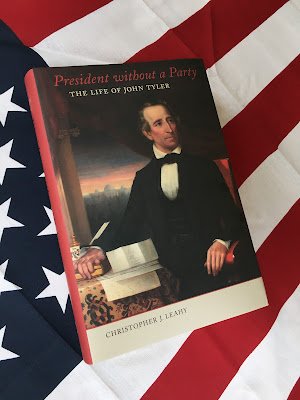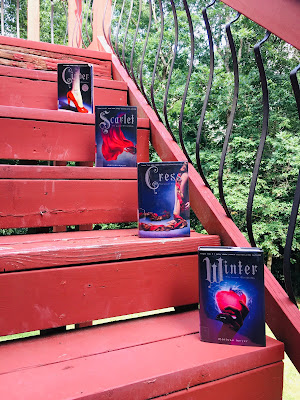And we march on through the United States presidents. John Tyler was our nation's tenth president (so we've finally hit the double digits—yay!) and the first vice president to assume the presidency after the death of the elected president, in this case William Henry Harrison who served as president a mere thirty-one days after his inauguration before succumbing to illness.
So, let's get into it, shall we? Despite being considered by most historians as a largely ineffectual president, I found Tyler fascinating and enjoyed learning more about him.
I'm not sure if I've mentioned this on the blog or not, but before choosing what presidential biographies to read, I always consult Stephen Floyd's excellent blog in which he has chronicled his own (much more intensive) venture of reading through the American presidents. If you have even the smallest interest in reading a presidential biography of any of our nation's presidents, I cannot recommend his site enough in helping you choose what to read. And in the case of John Tyler, Stephen says Christopher J. Leahy's 2020 offering stands alone so Leahy's book is what I read.
John Tyler was born in 1790 into one of the prominent First Families of Virginia and grew up under a father who was heavily involved in state politics. Owing in large part to the early death of his mother who died when he was only seven years old, he was profoundly influenced by his father and followed in his footsteps to become a lawyer and enter politics at a very young age.
Throughout the course of his career, Tyler served in the Virginia legislature, the U.S. House of Representatives and the Senate, the governorship of Virginia (like his father), the office of vice president (briefly), and finally as president of the United States. Between posts he practiced law, and after his term as president ended he settled down on his plantation and took his role as planter very seriously. During the War of 1812, he organized a militia company which he commanded with the rank of captain, but they never saw any action and he dissolved the company after two months. For the rest of his career, his political enemies mockingly called him "Captain Tyler" any time they wanted to insult him.
Because Harrison was the first president to die in office and because the Constitution was maddeningly vague on the point of presidential succession, Tyler set pretty much all the precedents for assuming the presidency after the death of the elected president, and he did it decisively and aggressively. His precedent was finally confirmed in the form of the 25th Amendment in 1967—over 100 years after Tyler's death! I found this bit of history endlessly fascinating so indulge me for a moment while I hash it out with you guys. Tyler was kindof a throwaway choice by the Whig party to fill the slot as vice president on William Henry Harrison's ticket. While "Tippecanoe and Tyler too" is probably the most popular and memorable campaign slogan in history, no one expected Tyler to do anything as vice president or to go any further in politics after Harrison's time as president ended. From what I can tell, Tyler himself had no grand aspirations to become president. He didn't have the support to win that office on his own. Why the Whigs chose him is really a mystery to me, especially given the fact that Harrison was the oldest man elected president at a time when personal health and longevity weren't great given what was known in medicine. I have to wonder if Henry Clay didn't think he could somehow get himself into the role of president if William Henry Harrison died in office.
Obviously, it didn't work out for Henry Clay, and because of Tyler's somewhat tenuous connection to the Whig party in the first place, his ascension to the presidency immediately after Harrison's death was pretty much the worst-case scenario for all involved. And because Harrison died so shortly after being sworn in himself, Tyler practically served an entire presidential term. Unfortunately, just about everything at the federal level turned into a political gridlock as Clay and Tyler duked it out in an epic power struggle for nearly all of Tyler's presidency, resulting in Tyler being formally read out of the Whig party a mere five months into his presidency. So Tyler ended up with the double ignominy of being an "accidental president" and being the only president without a party. Crazy, right?
But let's not end it there. He's actually a triple threat in infamy as he was also the only "traitor president"—the only man who served in our nation's highest office to actually renounce the Union at the onset of the Civil War.
Despite all this, I kinda liked John Tyler. He was a strong states' rights advocate and a man of principle, and he stuck to his guns no matter what. The reason he got kicked out of the Whig party is because, ultimately, he wouldn't let Clay and the rest of the Whigs bully him into signing their pet proposals into law. He was a friend to the executive prerogative of veto, and you know what? I'm here for him. He considered the annexation of Texas the crowning achievement of his presidency, even though he signed it into law mere days before Polk took office. And let's just give it to him, because he worked on it for years, okay?
On the personal front, buckle up because he was also our nation's most fertile president fathering fifteen children. He and his first wife Letitia had eight (possibly nine) children together, and seven of their children grew to adulthood. Letitia died while he was serving as president, and he got married only two years later—while still serving as president—to the beautiful young Julia Gardiner, thirty years his junior and, age-wise, smack dab in the middle of the lineup of his own children. Which is a little gross if you ask me, but they really seemed to love each other. They wasted no time and had seven children together. Tragically, in the midst of his second fatherhood, he lost three of his adult daughters in a pretty short span of time, two dying due to complications in childbirth and the third from an infection. While he was a devoted father, he was largely absent in all of his children's lives: the first time around owing to his political career; the second time because of his death. At the time of his death, Julia's oldest child was only fifteen and her youngest, not even two.
One other fun fact about Tyler that I just have to include because hello! this whole blog is about books and reading is that in the middle of his presidency in 1842, he hosted a massive party at the White House to honor two famous guests: celebrated American author Washington Irving, and none other than Charles Dickens himself. What?!
As for the biography itself, President Without a Party: The Life of John Tyler by Christopher J. Leahy is well-written and (I think) extremely interesting. While at times I did feel like Leahy got a little long-winded and could've been a little more concise, overall I thought he did an exceptional job. I appreciated how he took the time to sum up large sections of his writing with a simple question to boil down the topic he covered to his main point. It's not the best presidential biography I've read to date, but it's a long way from the worst. I would definitely recommend it if you have any interest in the life of John Tyler.
I've still got two more presidential biographies on my list for 2022, and while it may be a bit of a stretch at this point in the year, I'm still hopeful of getting through them both before the year is through. If you had to choose one president to read a biography about, who would it be?






